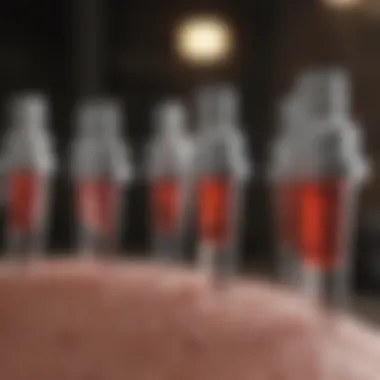Duration and Efficacy of the Hepatitis B Vaccine


Intro
In the realm of public health, the vaccine's role is paramount, especially when it comes to infectious diseases like hepatitis B. This viral infection can lead to serious consequences, including chronic liver disease, and its global prevalence underscores the need for effective preventive measures. The hepatitis B vaccine has been a cornerstone in reducing the incidence of this disease. However, questions loom regarding how long the protection from this vaccine lasts and what factors can influence its longevity. This exploration seeks to clarify the duration of immunity offered by the hepatitis B vaccine, the circumstances that may affect it, and the recommendations surrounding booster shots.
Research Overview
Summary of Key Findings
Numerous studies have attempted to capture the essence of the hepatitis B vaccine's efficacy over time. Evidence suggests that the vaccine provides strong immunity for at least 20 years in a significant number of individuals. Examinations of various population groups indicate variations in longevity, with some subsets exhibiting a gradual waning of protective antibodies over time. The CDC emphasizes that while individuals generally maintain immunity, specific populations, such as the elderly and those with immunocompromising conditions, may require additional attention regarding booster vaccination.
Importance of the Research
Methodology
Study Design
The approach to studying the longevity of the hepatitis B vaccine typically involves longitudinal cohort studies, wherein groups of vaccinated individuals are assessed over time. These studies analyze the persistence of antibodies and the incidence of hepatitis B infection within these populations, thus providing essential data.
Data Collection Techniques
To acquire detailed insights, a variety of data collection methods have been utilized:
- Serological testing to measure antibody levels in vaccinated individuals.
- Surveys and interviews to understand vaccination history and any booster shots received.
- Epidemiological surveillance to track cases of hepatitis B infection in vaccinated versus unvaccinated populations.
Researchers have often employed statistical methods to ensure that the data reflect true correlations between vaccine longevity and various demographic factors. Through such rigorous research methods, the findings contribute to a well-rounded understanding of how the hepatitis B vaccine operates in real-world scenarios.
Preamble to Hepatitis B
Understanding hepatitis B is crucial for anyone considering vaccination or involved in public health discussions. This virus can cause serious liver problems, including cirrhosis and liver cancer. The importance of discussing hepatitis B lies not only in acknowledging its medical impact but also in promoting awareness and prevention strategies through vaccination. The hepatitis B vaccine is one of the most effective public health tools available, significantly reducing the instances of infection and its complications.
Overview of Hepatitis B Virus
Hepatitis B virus (HBV) is a viral infection that primarily affects the liver. It’s transmitted through contact with infectious body fluids—this includes blood, semen, and other types of bodily fluids. Intriguingly, HBV can survive outside the body for several days, making it more contagious than one might assume. The acute form of the disease may lead to symptoms such as jaundice, fatigue, and abdominal pain. But what’s alarming is that many people do not show any immediate symptoms, which can lead to a chronic infection.
Chronic HBV infection poses substantial health risks, including serious liver disease and liver cancers. This duality of symptoms—from mild to severe—means that understanding the virus is central to curbing its spread and addressing its health implications.
Importance of Vaccination
The importance of vaccination against hepatitis B cannot be overstated. The vaccine has proven to be a powerful weapon against this infection, offering long-lasting immunity. Two or three doses of the vaccine, depending on the formulation used, can typically protect an individual for years, if not decades. It has been particularly impactful in reducing the incidence of liver cancer associated with chronic hepatitis B cases.
Moreover, vaccination is not just about individual protection, it contributes to herd immunity. When a sufficient number of people are vaccinated, the entire community—especially vulnerable populations—benefits. Since hepatitis B can be transmitted in various ways, ensuring widespread vaccination is a key public health goal.
"Vaccination is not merely a personal shield; it is a communal fortress against infectious diseases like hepatitis B."


In essence, understanding hepatitis B and the significance of its vaccine can help foster an informed and health-conscious society. By recognizing the pathways of transmission, the severity of disease, and the benefits of vaccination, individuals can make knowledgeable choices that protect themselves and their communities.
Nature of the Hepatitis B Vaccine
The hepatitis B vaccine, an instrumental player in public health, plays a critical role in safeguarding individuals from the hepatitis B virus. Understanding this vaccine's nature, especially in terms of its formulation and mechanism, as well as its efficacy, lays the groundwork for discussions about the vaccine's longevity. For anyone considering vaccination or involved in healthcare, grasping these elements is crucial. It's not just about sticking a needle into an arm; it’s about the science that goes into protecting one's health and the community’s well-being.
Formulation and Mechanism
The hepatitis B vaccine is formulated using a recombinant DNA technology, which involves inserting a piece of the virus's genetic material into yeast or another expression system. This technique leads to the production of the hepatitis B surface antigen (HBsAg), which is the part of the virus that prompts an immune response. Once the vaccine is administered, the immune system recognizes HBsAg as a foreign invader. It then produces antibodies that are specifically poised to fight off hepatitis B should one ever encounter it. This is kind of like preparing a fire extinguisher; just having it handy won’t extinguish a fire, but it certainly preps you for when flames do show up.
One noteworthy consideration here is the immune memory effect. After being vaccinated, the body doesn't just forget about the hepatitis B virus. The immune system retains a memory of the attack, ensuring a rapid response if the virus attempts to invade in the future. This capability is what many people hope for, but the actual longevity of that immunity depends on several factors, which leads us perfectly into the next point.
Clinical Efficacy Rates
When understanding the effectiveness of the hepatitis B vaccine, clinical efficacy rates become a critical focal point. Various studies have shown that after the initial three-dose series, the vaccine provides around 90% efficacy in healthy adults. This means that for individuals who have completed the vaccination schedule, the likelihood of developing an infection after exposure to the hepatitis B virus is significantly lowered.
However, it's essential to recognize that efficacy may diminish over time, which brings about discussions concerning boosting immunity. In populations with other health concerns or the elderly, efficacy can be even lower. For example, studies suggest that older adults may exhibit a weaker immune response, often necessitating additional booster shots to maintain the level of immunity found in younger individuals.
"Vaccination efficacy is like a protective shield. The better you build it, the longer it lasts, but age and health can wear it down."
To summarize, the hepatitis B vaccine’s formulation is a cornerstone that enables a robust immune response. Furthermore, while the clinical efficacy rates are impressively high, individual responses may vary, highlighting an urgent need for tailored health recommendations.
So when discussing the longevity of the hepatitis B vaccine, understanding its foundational elements—namely formulation and efficacy—is vital. This equips healthcare professionals and patients alike with the knowledge they need for informed decision-making and understanding the broader implications for public health.
Duration of Vaccine Efficacy
Understanding the duration of vaccine efficacy is crucial when discussing the hepatitis B vaccine. This section sheds light on how long the vaccine confers protection, the factors that might influence this timeframe, and the implications for public health and individual immunity.
Initial Vaccination Schedule
The initial vaccination schedule for the hepatitis B vaccine typically consists of three doses given at specific intervals: the first dose is administered to newborns or infants shortly after birth, the second dose is given at one to two months, and the third at six months. This structure aims to establish a solid immune foundation against the hepatitis B virus.
Adhering to this schedule is vital. If a dose is missed, it can lead to gaps in immunity. Studies have shown that children who follow this recommended timeline are significantly less likely to develop chronic hepatitis B infections later in life. The first dose kicks off the immune response, while the subsequent doses serve to strengthen and extend that protection, ensuring that the body has a robust defense against potential infections.
Longevity of Immune Response
After completing the initial vaccination series, many people wonder, "How long will I be immune?" The length of this immune response is not uniform; various studies indicate that most individuals maintain protective antibody levels for at least 20 years after vaccination. However, a decrease in antibody levels over time is observed, which raises questions about the continued effectiveness of the vaccine.
Even with lower antibody levels, research indicates that the immune system retains a memory of the virus. This means that, should exposure to the virus take place, the body could mount a strong response against it, despite reduced antibody volume. This phenomenon underscores the importance of understanding how immunological memory functions and its role in ongoing protection against hepatitis B infection.
"The lasting memory of the immune system can be likened to a seasoned librarian, ready to pull dusty tomes off the shelf at a moment's notice, whenever needed."
Scientific Studies on Immunity Duration
Numerous scientific studies delve into the duration of immunity provided by the hepatitis B vaccine. For example, a significant study published in the journal Vaccine tracked participants up to 30 years post-vaccination, noting that while antibody levels decreased over time, the overall immunity remained intact in a large majority of individuals. Findings like these suggest that while vaccination is a key tool in disease prevention, the possibility of booster shots may be considered for those who are at higher risk of exposure.


Research continues to explore specific demographics that may exhibit different responses to the vaccine. For instance, some studies suggest that older adults may experience a more rapid decline in antibody presence compared to younger individuals. This aspect becomes vital for public health recommendations, especially as populations age and the risk of viral exposure remains.
Thus, ongoing scientific inquiry serves not just to elevate our understanding of the vaccine’s effects but also to guide public health policies towards a more tailored approach in administering booster doses, if necessary.
By illuminating the duration of vaccine efficacy, this section provides vital context for healthcare providers and the general population alike, steering conversations towards informed decisions regarding hepatitis B vaccination and immunity.
Factors Influencing Vaccine Longevity
The longevity of the hepatitis B vaccine is a topic of significant importance within the realm of public health. Various factors play crucial roles in determining how well and for how long the vaccine protects individuals from hepatitis B infection. Understanding these factors not only informs medical professionals about the expected duration of immunity but also guides public health policies surrounding booster shots and vaccination schedules. Delving into these influences is essential for improving vaccination strategies and ensuring maximum community protection.
Age-Related Variability
The age of an individual at the time of vaccination can greatly affect the longevity of the vaccine's efficacy. Research shows that younger individuals often exhibit a stronger immune response compared to older adults. This can be attributed, at least in part, to the robustness of the immune system during childhood and adolescence.
Consider that children and adolescents not only tend to generate higher levels of antibodies post-vaccination but also maintain those levels for an extended period. Research indicates that infants may respond even better to the vaccine than young adults, likely due to their rapidly developing immune systems.
In contrast, elderly populations might not respond as effectively. A diminished immune function, often dubbed immunosenescence, appears to compromise antibody production. As people age, their immune systems evolve to become less responsive to new infections, which can also affect how long vaccine-induced immunity lasts. Hence, age is a pivotal factor in gauging the longevity of the hepatitis B vaccine, tying directly to the necessity for tailored vaccination strategies for various age groups.
Health Status and Immune Function
The overall health status of an individual can significantly dictate the effectiveness and duration of the hepatitis B vaccine. Those with existing health conditions such as diabetes, autoimmune disorders, or other chronic illnesses may face compromised immune responses. This compromised state often leads to lower antibody production after vaccination and a shorter duration of immune defense.
For instance, individuals receiving immunosuppressive therapies—like chemotherapy or corticosteroids—are at a heightened risk of suboptimal vaccine response. Their immune systems, already weakened by treatment, may not generate the requisite antibodies effectively. On the other hand, individuals with well-functioning immune systems are likely to sustain longer-term protection against hepatitis B.
When evaluating vaccine longevity, it’s important to recognize potential barriers posed by patients' health status. This understanding can better inform healthcare providers in administering booster shots that are essential for maintaining protective immunity when needed.
Genetic Factors
Genetic variability among patients is another layer that influences how long the protection from the hepatitis B vaccine lasts. Studies suggest that genetic predispositions can result in differences in immune system functionality. Certain genotypes may result in more robust immune responses and longer-lasting immunity compared to others.
Additionally, variations in Human Leukocyte Antigen (HLA) types can affect vaccine efficacy. HLA genes play a critical role in immune recognition; certain types are more efficient at presenting vaccine antigens, thereby prompting a stronger immune response. This genetic factor reveals yet another reason why some individuals experience longer-lasting immunity from the hepatitis B vaccine, while others might require more frequent boosters.
Booster Recommendations
Understanding booster recommendations for the hepatitis B vaccine is crucial for maintaining long-term immunity against this virus. While the initial vaccination series offers a solid foundation of protection, booster shots serve to reinforce and prolong that immunity. These boosters are necessary for certain populations and circumstances, as they can help guard against waning immunity over time.
Guidelines for Booster Shots
The general consensus among healthcare professionals is that most individuals who complete the initial three-dose series of the hepatitis B vaccine do not require routine boosters. However, there are exceptions. Here are some guidelines:
- High-Risk Populations: Individuals at higher risk, such as healthcare workers, people with chronic liver disease, and those engaged in high-risk behaviors, may benefit from periodic booster shots.
- Confirmed Low Antibody Levels: Blood tests can measure the presence of antibodies against the hepatitis B virus. If levels fall below a specific threshold, a booster may be indicated.
- Outbreak Situations: In cases of outbreaks, administering a booster might be necessary to ensure collective immunity within vulnerable communities.
In essence, these guidelines underline the variability in response to the vaccine. For some, a booster may be as important as the initial series, depending on individual health and risk factors.


Population-Specific Recommendations
Specific groups might have tailored recommendations regarding hepatitis B vaccination boosters. Here are key insights:
- Infants Born to Infected Mothers: Babies born to mothers with hepatitis B should receive the vaccine and a dose of hepatitis B immunoglobulin within 12 hours of birth, followed by further doses according to schedule. Continuous serological testing to monitor the effectiveness of vaccination is crucial.
- Older Adults: Aging can affect immune responsiveness, making older adults more susceptible to waning immunity. For this cohort, health care providers may recommend more frequent monitoring and potential boosters as needed to ensure continuing immunity.
- Travelers: People traveling to endemic areas may need to consider a booster, especially if their initial vaccination occurred more than five years ago.
"Ensuring that populations at risk receive appropriate boosters is vital in combating the hepatitis B virus comprehensively."
These population-specific recommendations reflect the need for personalized healthcare approaches that take into account both individual and public health considerations. The variability in response emphasizes the necessity of tailored vaccination strategies, often linked to societal and environmental factors.
In summary, booster recommendations play a pivotal role in mitigating the risk of hepatitis B infections, especially for certain populations. Continuous monitoring of immunity levels and adapting vaccination strategies is essential in creating an effective public health response to hepatitis B.
Ongoing Research and Future Directions
The field of hepatitis B vaccine research is constantly evolving, much like the virus it aims to protect against. Understanding the longevity of the vaccine and how various factors influence its effectiveness in different populations is crucial. Medical professionals and researchers are actively investigating new ways to enhance vaccine efficacy and address ongoing public health challenges.
Current Research Initiatives
Research initiatives currently underway focus on several vital areas:
- Extended Duration Studies: New studies are attempting to establish the duration of immune response in various demographics beyond the standard timeframes. Many researchers are looking into how immunity lasts in older adults or immunocompromised individuals, as these groups may respond differently to vaccinations.
- Alternative Formulations: Research teams are experimenting with novel vaccine formulations. For instance, some trials are testing combination vaccines that might boost the immune response against hepatitis B alongside other viruses, such as hepatitis A or the flu.
- Adjuvants Exploration: The use of adjuvants — substances that enhance the body's immune response to a vaccine — is another active area. Different types of adjuvants are being studied to optimize the immune response, potentially leading to longer protection without the need for frequent booster shots.
"Investments in ongoing research are the key to pushing forward our understanding of how best to manage viral infections and immunization strategies."
Challenges in Vaccine Research
While the current initiatives are promising, researchers face numerous hurdles:
- Diverse Population Responses: One major challenge is the variability in how different populations respond to vaccines. Factors such as genetic background, existing health conditions, and even socioeconomic status can obscure the efficacy of the immunization across different groups.
- Viral Mutations: The hepatitis B virus is known to undergo mutations. These changes can potentially affect how well the vaccine continues to provide protection, necessitating continuous monitoring and adaptation of vaccine strategies.
- Resource Limitations: Effective research is often hindered by limited funding and resources. Researchers need adequate support to ensure that studies can be expansive and varied enough to draw meaningful conclusions.
- Communication Gaps: Lastly, there’s often a disconnect between research findings and public understanding. Effectively communicating the implications of research to the general public and healthcare professionals remains a significant hurdle.
As we tread further into the complexities of hepatitis B and its vaccine, solution-driven research methodologies will be essential in crafting effective immunization strategies. The pursuit of knowledge in this domain is vital for enhancing public health outcomes globally.
Epilogue
In wrapping up this exploration of the hepatitis B vaccine's longevity, several crucial elements emerge as particularly noteworthy. One of the primary points is the summary of key findings that delineate the vaccine's effectiveness over time. The efficacy rates established through various studies indicate that while initial protection is robust, factors such as age and health status can notably influence immune response durability.
Summary of Findings
The body of evidence consistently attests to the vaccine's ability to generate a strong immune response shortly after the completion of the vaccination schedule. However, as individuals age, or if there are existing health complications, the immune response may decline at different rates. Some pivotal findings include:
- A substantial majority of vaccinated individuals maintain protective antibody levels for at least 20 years post-vaccination.
- Immunity against hepatitis B is less resilient in older populations or those with compromised immune systems.
- Current guidelines for booster shots are primarily recommended for specific demographics; generally, previously vaccinated individuals do not require boosters.
Examining these findings sheds light on the significance of personalized medicine, as recognizing individual variability becomes increasingly pertinent in public health discussions.
Implications for Public Health
The implications of the findings discussed are vast, influencing not only individual health decisions but also broader public health policies. Understanding the nuances of vaccine longevity aids healthcare professionals in advising patients on vaccination schedules tailored to their unique circumstances. Some critical considerations include:
- Development of tailored vaccination programs that can enhance protection for vulnerable populations.
- Informing public health campaigns that emphasize the importance of vaccination boosters, particularly among at-risk groups.
- Encouraging ongoing research aimed at better understanding how genetic and environmental factors impact vaccine effectiveness over a person’s lifetime.
By taking into account these elements, public health strategies can be refined to expand the reach and effectiveness of the hepatitis B vaccination program, ultimately aiming to curb the incidences of this preventable disease.



